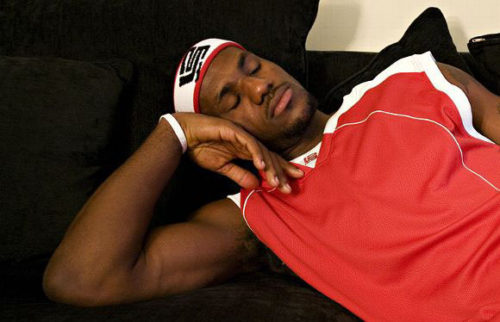
Proper nutrition, hydration and rest are important to everyone, but more so to athletes, who are constantly burning energy. Whether you are an athlete or just an average person pursuing fitness goals, you must think of rest as actual, proper sleep rather than just a period of relaxation.

The benefits of sleep are many and its importance goes way beyond just boosting your mood or banishing under-eye circles. Adequate sleep, a key part of a healthy lifestyle, can benefit your heart, weight and mind. With regard to athletes, it has been proven that adequate sleep improves performance.
According to a Stanford University study, college football players who tried to sleep at least ten hours a night for seven to eight weeks improved their average sprint time and had less daytime fatigue and more stamina. The same was found in tennis players and swimmers. For instance, Serena Williams reportedly goes to bed at 7.30 pm when she is in tournament mode. However, if you are not putting in hours of training and playing sports on a daily basis, ten hours sleep is much too much; at least seven hours would be sufficient.
As regards persons pursuing fitness goals and a healthy diet as part of those goals, getting to bed early is necessary. Studies have found that persons who are well rested lose more fat when pursuing a diet and exercise programme as opposed to those who are sleep deprived, who tend to lose muscle mass instead. Sleep also offers the body an opportunity to repair damage caused by exercise, improves blood flow, and removes stress.
The NBA nap
I am a huge fan of the NBA and with the finals on involving the Golden State Warriors and my favourite team, the Cleveland Cavaliers, I stumbled on an article which stated that every afternoon during the NBA season, players lie down and take a nap before their game. Players like Jeremy Lin, LeBron James and Derrick Rose swear by the power of the midday nap. The napping culture is so prevalent that league officials know better than to call players in the afternoon. In the meantime, teams like the Warriors are looking into ways to improve their sleep performance.
According to the National Sleep Foundation, a US-based non-profit organisation, a short nap of 20 to 30 minutes in the afternoon can help to improve mood, alertness and performance.
If you are not getting enough sleep throughout the day, a short nap can go a long way toward improving your athletic performance. However, napping, including the famous NBA nap, is not for everyone.
Sleep experts have determined that long daytime naps can interfere with nighttime sleep. So if you are getting to bed at a regular time each night – which is ideal – avoid napping during the day. However, if you have to be up late, for instance, if you work nights, you should absolutely nap during the day to make up for your sleep deficit.
Make it comfortable
There is much more to sleep than plopping down on a bed somewhere and closing your eyes. If you have seen mattress commercials on television, you know that having the right one can make the world of difference when it comes to having a good night’s rest. And even if you don’t believe the commercials your body tells you the next day. If you sleep on a good mattress you are likely to wake up feeling rested. However, if your mattress is old, lumpy, too hard or too soft, you will wake up with body aches the next day if you sleep at all.
There are three other basic steps to attaining a good night’s rest. First, be sure the room is as dark as you can get it. Lights must be switched off. You should also switch off cellular phones and other electronic devices or place them in a drawer or in another room. If necessary, place dark blinds at the windows or use a sleeping mask. Second, the room must be quiet. Try to eliminate noises from outside as much as possible. Third, the room needs to be cool. Ideally, the temperature should be 68 degrees or less.
Sleep is critical for both athletes and non-athletes. It is important to get seven to nine hours of sleep. The key is to keep your sleep patterns as consistent as possible. So get off the computer and get some quality rest. It makes a difference.
Stay tuned, friends. If you have fitness goals and need personal training or meal plans I can help! Serious enquiries only.
Email now to emmersoncampbell@gmail.com




